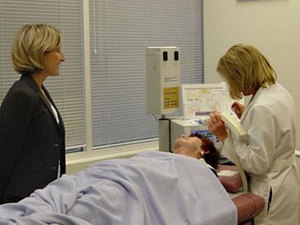There is a high desire for the need of B negative blood type. Out of millions of registered voters and civilians, we are forced to rely on a very frail 2% of Americans to step forward and donate. Unfortunately, the real challenge is that there are still not enough people who are participating at blood drives.
One of the biggest challenges in society today is getting young persons to donate more frequently. Apparently, the torch from elder generations isn’t accepted by the youth of today. Many young persons just aren’t donating enough and elder citizens aren’t capable to give away their blood when they need it themselves.
Longtime Takoma Park, Maryland resident, Mitchell Tropin, is CMV negative and one of the most cordial blood givers in the United States today. Tropin, 55 and a blood donor with Red Cross for twenty-eight years, has saved more than 800+ lives since he first began in 1978. Mitchell possesses a rare B negative blood that is common only in 2% of the population as mentioned. I was just so choked up, I couldn’t speak,” Tropin admitted in his Prince George’s Community College classroom in Largo, Maryland. “It was a life changing experience to know that I could make such a difference.”
With only 2% of the population supplying Americans with B negative type blood, there is only 20% of Americans who aren’t infected with CMV. CMV (Cytomegalovirus) is a non-fatal disease that at least 80% of Americans have. Despite it’s attachment to the terms disease and virus, CMV is barely mentioned by physicians and doctors because of its harmless background. Perhaps, one would guess is that doctors consider it just a way to scare patients out of normal checkups.
CMV and B negative blood are strongly desired throughout the country. It’s extremely difficult to find blood donors because of the frail 2% CMV free and 20% population free of these blood defects. It is essential that these special donors step forward because persons of CMV and B negative blood cannot donate to other persons of Lower or weaker immune systems. Thus, the need has greatly increased in recent years and many of us our still waiting for those rare blood types to step forward.
Although to many persons CMV is reported non-threatening, it is harder on persons with weaker immune systems. Newborns especially and those already diagnosed with HIV and AIDS. CMV contains retinltis (ret-in-ltis) that can cause blindness for persons with aids. In addition, symptoms can also include and may not be limited to: painful swallowing, diarrhea and pain, weakness and numbness in legs, swollen glands, fever and sore throat.
For more information please contact
American Red Cross national headquarters
2025 E Street NW, Washington, DC.
202-343-4498
or
www.redcross.org
